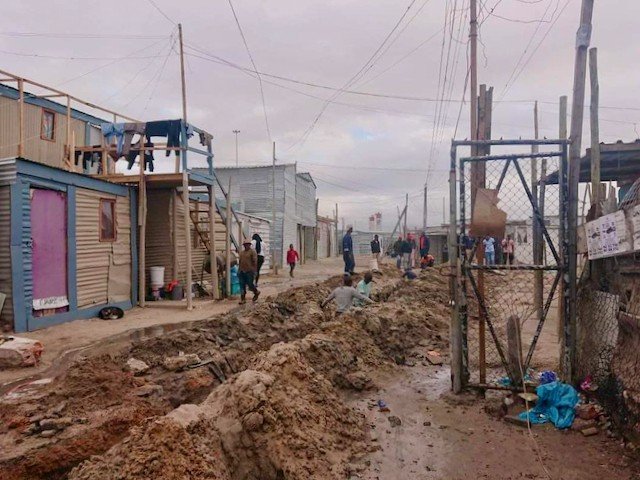Tired of waiting for government, Dunoon shack dwellers build a sewage system
“If you wait for the City to render services, you will wait forever” says community leader
Residents dug trenches, installed sewer pipes and connected them to flush toilets they had bought and installed themselves. Photo: Supplied.
Residents in an informal settlement in Dunoon near Milnerton, Cape Town, have started their own sewage system. They have bought and installed flush toilets together with the sewage pipes.
Households were asked to contribute R700. Those who could not afford to contribute, provided labour for free, digging sewer trenches. They then connected the pipes to a municipal sewer line.
Thembelani Ndebesimbi, a community leader in Ekupholeni informal settlement, located on a municipal sports field, installed his own flush toilet in his shack. “If you wait for the City to render services, you will wait forever,” he said.
He said he had been on the housing waiting list for ages. “We asked for serviced plots. They could not give that … We made provision for our own water services and then toilets.”
Ndebesimbi said they started with water in 2018, just months after occupying the land. Then they started sewage. Now 16 homes have flush toilets, which neighbours share.
He says they have qualified plumbers living in the settlement. “We didn’t pay them. They did it pro bono. Those of us who don’t have plumbing skills, we dug the trenches.”
Community leader Pesi Masigcinane said, “To stay in a place without water and electricity, without toilets – there is no dignity. So the best way is to contribute money and do things on our own, because we would wait forever.”
Mayco Member for Water and Waste Councillor Xanthea Limberg said that according to the municipal by-laws to protect the sewer system “the City has the authority to remove [these] illegal connections”.
“An investigation will be conducted by the City’s Water Pollution Control Inspectorate and appropriate action will then be taken based on the outcome,” said Limberg.
“The risk for possible environmental pollution and associated health risks is high if undertaken by unqualified and inexperienced people. Should untrained people fix blockages, it can also cause further blockages upstream,” said Limberg.
Meanwhile, some residents in the informal settlement have started to build structures with brick and mortar instead of temporary materials.
Support independent journalism
Donate using Payfast

Don't miss out on the latest news
We respect your privacy, and promise we won't spam you.
Next: Cape Town’s Anti-Land Invasion Unit is unlawful, argues SAHRC
Previous: Minister and Lottery board “at war” over new chair
© 2021 GroundUp. This article is licensed under a Creative Commons Attribution-NoDerivatives 4.0 International License.
You may republish this article, so long as you credit the authors and GroundUp, and do not change the text. Please include a link back to the original article.
We put an invisible pixel in the article so that we can count traffic to republishers. All analytics tools are solely on our servers. We do not give our logs to any third party. Logs are deleted after two weeks. We do not use any IP address identifying information except to count regional traffic. We are solely interested in counting hits, not tracking users. If you republish, please do not delete the invisible pixel.

